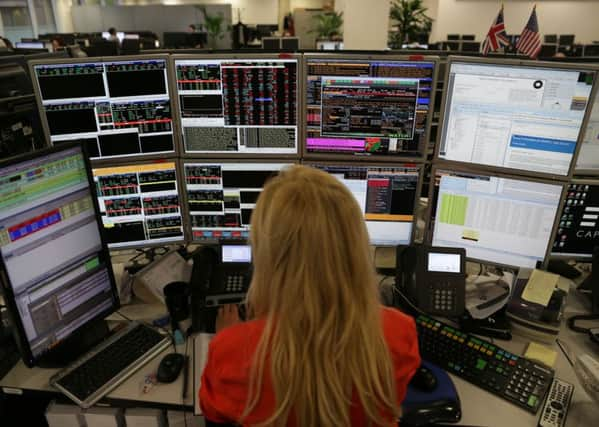Bill Jamieson: Time for investors to take stock of gains
This article contains affiliate links. We may earn a small commission on items purchased through this article, but that does not affect our editorial judgement.


It’s part, it seems, of a new period we have entered – the post-truth era. But for those who have followed financial markets, how can this be hailed as a revelatory discovery, still less a new era?
The biggest decisions made in the financial world – whether business investment and take-overs or household savings and investments – have always been the result of the most powerful emotions of all – fear and greed.
Advertisement
Hide AdAdvertisement
Hide AdWhat sends markets into a tailspin – or drives them to new record highs as we have seen in the past week – are fluctuations in investor mood. We may seek to rationalise these by reference to analysis and statistics, by looking at similar behaviour in the past or by mulling over economic forecasts and predictions.
But which statistics do we choose to believe? Past performance is little guide to the future. And economic forecasts – as even the Bank of England’s chief economist now admits – can be as wayward as TV weatherman Michael Fish’s infamous “no hurricane” prediction.
Problems arise when conflicting emotions are played out in markets simultaneously. Not only is the overall direction of markets the outcome of a constant battle between opposing emotions but there are also undercurrents that can change the overall direction – and with little visible warning that such a change is at hand.
What is particularly interesting about the current surge in markets is that it has been running coincident with investor scepticism – a lack of conviction, most evident in official pronouncements about the future. Pessimism has also been the widely prevailing theme across the economic and political world. Yet last week the FTSE 100 closed above the 7,200 mark for the first time ever and scored the seventh successive closing high.
What the market will soon need is a new story to feed its relentless desire for a rationalised direction. For the moment, the fall in sterling has greatly helped UK share prices, making the UK more rewarding for overseas investors while giving a big helping hand for UK exporters and companies that earn a large amount of their profits from overseas.
And the US story for now is of an economy that is performing rather well and that a Trump presidency will bring a significant boost to infrastructure spending. Yet we still haunted by fears of what befell us in 2000 after the last time markets greeted the New Year on an all-time high – a vicious bear market that took the index down by some 70 per cent by early 2003. Then came the financial crisis of 2008-9, leaving us with a permanent crick in the neck as we scanned the horizon for another “Minsky Moment” or Black Swan event.
Investment choice and asset allocation becomes that much more difficult with markets as buoyant as they are now – and prone to setback. This may be a good opportunity for investors to realise some of the recent gains and re-allocate to those geographic areas and sectors that have not been swept up in the Feel-Good-But-Wary market advance. And nothing beats the age-old wisdom of feeding in small amounts mechanically and regularly over time – to minimise the risk of being caught out by our own mood swings and emotions.
For Scottish investors, a handful of well-kent funds and trusts have hogged attention – Scottish Mortgage, Monks, Standard Life and, of course, Alliance Trust, which has been running like a soap opera for the past few years.
Advertisement
Hide AdAdvertisement
Hide AdSo it is refreshing to see an overlooked trust enjoy some well-merited attention. Scottish Investment Trust has just unveiled an impressive set of results and an eye-catching 40 per cent hike in the dividend. Shares in the £754 million self-managed trust have risen by 38 per cent over the past 12 months, putting it in the top quartile of the global trust sector.
As a result one might think that the shares should now have shaken off the discount to net assets and be proudly sporting a premium. But no. As I mentioned here last month, the trust’s biggest external investor, insurance giant Aviva holding 12 per cent of the equity, has been selling down its holdings in global investment trusts. Fears that SIT may be next in line has resulted in new investors steering clear for now and creating an overhang.
SIT shares are now standing at a discount of just over 10 per cent to net assets. Given the keen investment performance and that dividend hike, the shares merit support.
